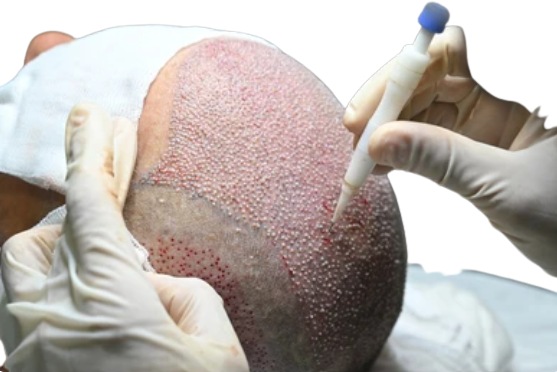Cancer Hair Loss Treatment
Cancer treatments such as chemotherapy and radiation therapy can often result in temporary or permanent hair loss. Losing hair during cancer treatment can be emotionally challenging for many individuals. While there is no guaranteed way to prevent hair loss during cancer treatment, there are some options available to manage and cope with hair loss:
Cold Caps/Scalp Cooling: Cold caps are tight-fitting, cold gel-filled caps that are worn before, during, and after chemotherapy treatment. They work by reducing blood flow to the scalp, which may help minimize the amount of chemotherapy drugs reaching the hair follicles. Scalp cooling can potentially reduce hair loss or make it less severe. It is essential to discuss this option with your oncology team to determine if it is suitable for your specific treatment and cancer type.
Wigs: Wigs are a popular option for individuals experiencing hair loss due to cancer treatment. There are different types of wigs available, including synthetic wigs and human hair wigs. Many cancer centers have resources or partnerships with wig providers who can help you find a wig that matches your natural hair color, style, and fit. Wigs can provide a temporary solution and help restore confidence during the hair loss period.
Scarves, Hats, and Head Wraps: Scarves, hats, and head wraps are versatile accessories that can be used to cover the head and protect it from the elements. They come in various styles, colors, and fabrics, allowing you to express your personal style while keeping your head covered.
Hair Prostheses and Hair Extensions: Hair prostheses, also known as hairpieces or hair systems, are designed specifically for individuals with partial or total hair loss. They can be custom-made to match your hair color, texture, and style. Hair extensions can also be used to add volume and length to existing hair if it is not completely lost.
Scalp Care: It is important to take care of the scalp during and after hair loss. Gentle scalp cleansing and moisturizing can help maintain a healthy scalp. Avoiding excessive heat styling, harsh chemicals, and tight hairstyles can prevent further damage to the hair and scalp.
Remember, the most suitable options may vary from person to person. It is essential to discuss your concerns and preferences with your oncology team, as they can provide guidance and recommend resources or support groups specializing in cancer-related hair loss.
Specialists
At Center For Hair Transplant USA, we understand that hair restoration is a unique journey for each individual. Our Specialist Hair Transplant team is dedicated to providing you with personalized solutions tailored to your specific needs and goals. With years of experience and expertise in the field, our specialists are here to guide you through every step of your hair transplant journey, ensuring exceptional results and your utmost satisfaction.




